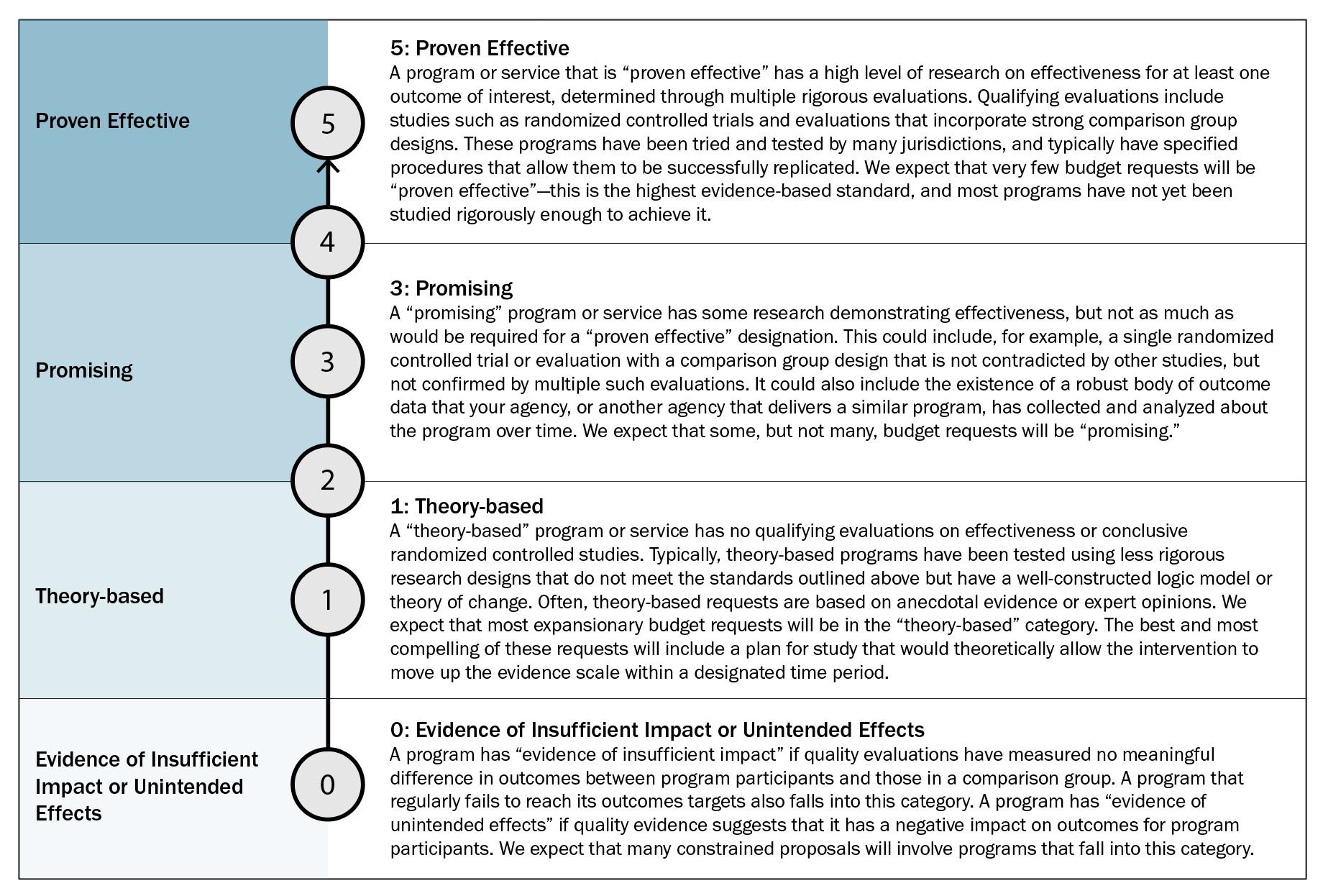How can a 9-page template transform a $10 billion budget?
Project Summary
The design of everyday paperwork matters. To ensure we can use evidence in the budget process, we need to distill that evidence quickly and efficiently. The Policy Lab worked with Rhode Island's Office of Management and Budget to redesign the form (called a "Decision Package") that Rhode Island Agency Staff use to submit their budget proposals. The new design helps users think and communicate clearly about the evidence behind their proposal. We provided training and support to staff to help them fill out the new form, and worked with OMB to update its Budget Guidance.
Why is this issue important?
If you’ve been near a budget office in the last twenty years, you know the rhetoric. Spend dollars on programs with evidence. Programs that perform. Programs with results. Everyone agrees, but how do you actually do that in the chaotic melee of real-world budgeting?
A challenge is that people inside the budget formulation process are both overwhelmed and underwhelmed with information. When preparing the typical Rhode Island budget for the next fiscal year, the Office of Management and Budget (OMB) analyzes budget submissions from 55 agencies, including over 500 high-level decision items, in the span of just 16 weeks. The process lasted a bit longer while concurrently preparing the FY22 budget and amending the FY21 budget to reflect the impact of COVID-19. Topics varied wildly: financial aid for small businesses; a dockside testing program for shellfish toxins; medicaid coverage for Doula care; cybersecurity infrastructure; furniture replacement. Details varied wildly too, from pages of technical justification, to almost no justification at all.
Unless wide swathes of evidence can be quickly and efficiently distilled into the budget process—at the right time and in the right ways for the right people—then that evidence stands no chance of being absorbed into the process. And when that happens, we may accidentally waste tax dollars.
What did we do?
This project begins with the insight that, when it comes to sharing information, the design of everyday paperwork and opportunities to discuss that paperwork matter. Templates can guide users on what information should be included, and templates can set guardrails for how to present that information.
We redesigned the form (called a “Decision Package”) that Rhode Island agency staff use to propose new budget items. We trained staff on how to use the template. We held daily office hours to help fill it out. We updated Budget Guidance.
Notably, and as you can see in the annotated budget template, the design was meant to help users think and communicate more clearly about the evidence behind their proposal. For example, we introduced an Evidence Scale (see Figure 1), which ranked a proposal in terms of its evidence base. Acknowledging that many programs have limited evidence, a series of questions were designed to help identify opportunities to invest in generating evidence.

What have we learned (so far)?
Staff welcomed the new template. If nothing else, the instructions and layout were simply easier to use. This improved flow increased buy-in, which is notable because the form actually demands more information to complete than in previous years.
That said, the form aims for better descriptions of the evidence, not joy. (Although, does not evidence amidst a beautiful form spark joy?) Did that happen? TBD, as we’re still conducting qualitative research on the process. For example, we’re assessing the quality of agency-provided evidence rankings by comparing those rankings to the rankings independently given by trained methodologists.
From case studies, though, early results are promising. Agencies that took advantage of trainings and office hours, in particular, showed marked improvements; they were more likely, for example, to include citations in their evidence narratives and to provide details on projected cost-benefit ratios. But not all agencies fully engaged (e.g. about 1 in 3 left the Evidence Scale blank). We expect we’ll need to double down on training and technical assistance in order to get the most from the new template. The blank Evidence Scales, for example, may reflect lingering uncertainty about how to use it (as opposed to opposition to using it). And we may need to further enhance the perceived value of support services, especially during crisis moments such as COVID-19, when bandwidth is strained and people may feel they don’t have time to do things like go to office hours.
What happens next?
We’ll update on the qualitative research mentioned above once done. In parallel, we’re preparing for the next budget cycle in Rhode Island, where we’ll further tweak the process and continue providing training and office hours.
And to our budget friends across the country: our template is freely and publically available for use. Copy it shamelessly. We’d be excited if you dropped us a line to say you’re using it, and we’d also be eager to work with you to make it even better. Email us at thepolicylab@brown.edu.
What happened behind the scenes?
The budget process is fast. Budget analysts occasionally need 24-hour turnarounds on feedback. To facilitate rapid, expert consultations about the evidence behind draft proposals, RI OMB and The Policy Lab entered into a Memorandum of Understanding, which empowered sharing internal documents and giving pro bono assistance. From August to November, we met daily to coordinate and debrief, often ping-ponging emails and calls on a near hourly basis. That is science in the bureaucratic trenches.
How to cite this Project: The Policy Lab. (2021, February 25). How can a 9-page template transform a $10 billion budget?. The Policy Lab. https://thepolicylab.brown.edu/projects/ri-budget-template

